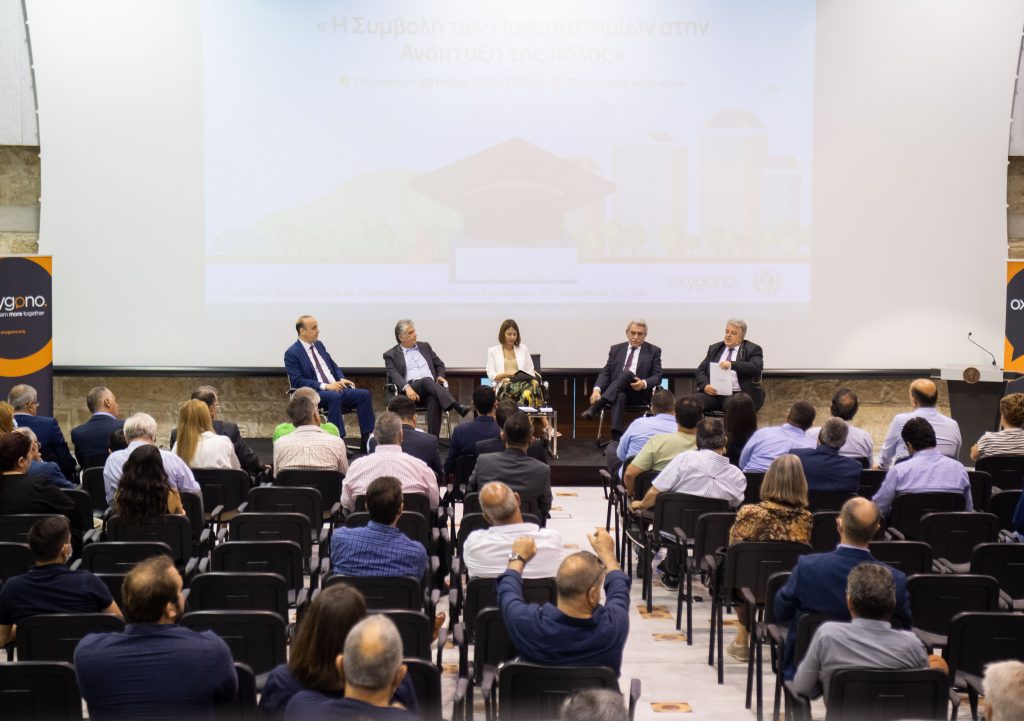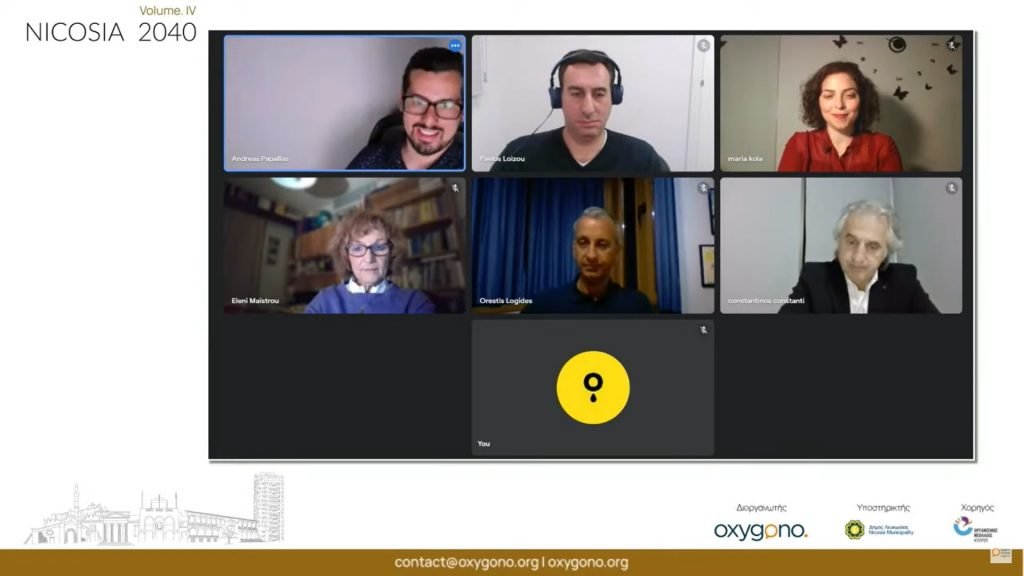The two-day Cyprus Forum for Local Government, in which the Mayors of the largest Municipalities of the island participated for the first time, in a coordinated effort to formulate a long-term sustainable plan for the development of the cities and communities of Cyprus, were successfully completed on Saturday 8 April 2023. The 1st Cyprus Forum Cities was co-organized by Oxygono and the Limassol Municipality, in the context of the participation of the Municipality in the European Mission: 100 Climate Neutral and Smart Cities by 2030, in collaboration with the Cyprus University of Technology (CUT), and is the basis for the development of a participatory process of exchange of views, expertise and information that will contribute to the achievement of the goal. Experts and academics highlighted important issues related to the sustainable development of local development, such as circular economy, sustainable mobility, energy and environment, sustainable tourism, maritime and blue growth, as well as the construction of Europe through local government. They also presented the dimensions that make up a "smart city", utilizing digital technology with the aim, among others, of traffic management, smart parking, waste and waste management, promotion of mobility, as well as implementation of a green strategy.
During the first day of the 1st Cyprus Forum Cities, speakers were the Director of the EU Missions Office, Deputy Director-General for Environment, Patrick Child, the First Vice-President of the European Committee of the Regions & Regional Governor of Central Macedonia, Apostolos Tzitzikostas, the Vice-President of the Committee of the Regions, Harald Sonderegger, Chrysis Nicolaides, Strategy Advisor and Consultant for Cities, Member of the EU Mission for Climate Neutral and Smart Council Cities, Bob D'Haeseleer, Consultant for Climate Neutral Cities, Dr. Constantinos Kleovoulou, on behalf of the Cyprus Institute and Penelope Vasquez Hadjilyra, Coordinator of the European Mission of the Limassol Municipality.
The proceedings of the second day of the Forum were opened by the President of Democracy, Mr. Nikos Christodoulides, who in his speech stated that "the development of synergies, such as the one encouraged today, is very important, since it brings together Organizations such as Oxygono, the Government, Local Government, the Academic Community and businesses, each contributing through his own perspective – each of us comes with his own experiences, Therefore, all these experiences, the know-how, come together through such meetings, through dialogue to achieve a holistic approach to key challenges we face, but also for necessary changes and reforms that will take our country forward." The President also said that the Government has integrated policies and promotes concrete actions for all sectors discussed at the conference – circular economy, sustainable mobility, energy, environment, blue economy, higher education and tourism. "Our ultimate goal is an economy that grows first and foremost with extroversion, that is resilient and competitive – you see the impact of the crisis in Ukraine on the occasion of the Russian invasion, so we need to expand the productive base of our economy," he added. "We need to reduce as much as we can on the basis of real data our dependence, we are an open economy, on external factors, so we can become more resilient and more competitive, always compatible with the principles of sustainable development and circular economy," he said. President Christodoulides also said that the main priorities of his administration are the sustainable economy, the protection of the environment and the upgrading of the quality of life of citizens in terms of sustainability.
During the first day of the 1st Cyprus Forum Cities, speakers were the Director of the EU Missions Office, Deputy Director-General for Environment, Patrick Child, the First Vice-President of the European Committee of the Regions & Regional Governor of Central Macedonia, Apostolos Tzitzikostas, the Vice-President of the Committee of the Regions, Harald Sonderegger, Chrysis Nicolaides, Strategy Advisor and Consultant for Cities, Member Board EU Mission for Climate Neutral and Smart Cities, Bob D'Haeseleer, Advisor for Climate Neutral Cities, Dr. Constantinos Kleovoulou, on behalf of the Cyprus Institute and Penelope Vasquez Hadjilyra, Coordinator of the European Mission of the Limassol Municipality.
The proceedings of the second day of the Forum were opened by the President of Democracy, Mr. Nikos Christodoulides, who in his speech stated that "the development of synergies, such as the one encouraged today, is very important, since it brings together Organizations such as Oxygono, the Government, Local Government, the Academic Community and businesses, each contributing through his own perspective – each of us comes with his own experiences, Therefore, all these experiences, the know-how, come together through such meetings, through dialogue to achieve a holistic approach to key challenges we face, but also for necessary changes and reforms that will take our country forward." The President also said that the Government has integrated policies and promotes concrete actions for all sectors discussed at the conference – circular economy, sustainable mobility, energy, environment, blue economy, higher education and tourism. "Our ultimate goal is an economy that grows first and foremost with extroversion, that is resilient and competitive – you see the impact of the crisis in Ukraine on the occasion of the Russian invasion, so we need to expand the productive base of our economy," he added. "We need to reduce as much as we can on the basis of real data our dependence, we are an open economy, on external factors, so we can become more resilient and more competitive, always compatible with the principles of sustainable development and circular economy," he said. President Christodoulides also said that the main priorities of his administration are the sustainable economy, the protection of the environment and the upgrading of the quality of life of citizens in terms of sustainability.
In his speech, President Christodoulides also referred to the choice to include Limassol among the 100 Climate Neutral and Smart Cities by 2030 through the EU Mission 2030 program. Limassol is called upon to be the ideal example of how cities can function as ecosystems of experimentation and innovation, in order to achieve the European goal of climate neutrality by 2050. "A goal that in the case of Cyprus has even more difficulties to achieve due to our distance from Europe, due to the insularity of our country and other circumstances. But we must not use these as excuses not to do what we need to do to achieve the goals of the green transition. Limassol in this Pan-European Mission is not alone. With her in this effort are all cities, it is the whole of Cyprus, since it is our national goal to fully align with the green goals of the European Commission," he said.
In his address, the founder and Executive President of the Cyprus Forum, Mr. Nicholas Kyriakides, said that the potential of local government, through digital technology, to improve the quality of life of citizens is limitless. So-called "smart cities" make use of digital technologies that include, inter alia, solutions for traffic management, infrastructure with built-in sensors, smart parking, waste and waste management, promotion of mobility, as well as mobile applications to provide services to citizens. In this context, he added, "improving citizens' quality of life must be at the heart of any political decision-making process taking citizens' concerns seriously. Participatory democracy at local level empowers citizens to participate in decision-making and drive change, thus navigating towards truly sustainable local government."
Invited speakers at the 1st Cyprus Forum Cities were also the Mayors of Limassol, Nicosia, Larnaka, Paphos, Aglantzia, Strovolos, Deryneia and Aradippou, who exchanged views on different aspects of the conference.
Within the framework of the Forum, the experience of the Limassol Municipality was also developed through its participation in the European Mission: "100 climate-neutral and Smart Cities by 2030", as a model for Cyprus itself, on how cities can function as experimentation and innovation ecosystems with the aim of achieving climate neutrality by 2050, in sectors such as energy, waste management, transport, built environment, etc.
The Cyprus Forum Cities aspires to become an annual institution and to contribute to the public debate and to include the Cypriot citizen, who must have a say in the formation of a modern and effective local government.

































